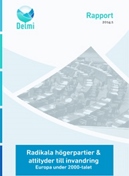With this overview of knowledge, Delmi wants to shed light on the political consequences of the presence of anti-immigration parties, at both national and local level. The study provides an overall picture of the extent to which anti-immigration parties are represented in different European countries and analyzes how it has affected political cooperation patterns and policy development.
Some overall conclusions and recommendations
- Cooperation patterns differ between countries. Differences in attitudes between countries and parties seem to be due in part to the country's culture of cooperation, the center-right parties' incentives for cooperation and perceptions of the anti-immigration party's legitimacy.
- Parties' policy influence also varies between countries. In general, policy on migration and integration has become more restrictive in Europe in recent decades, but it is still unclear to what extent this development can be linked to immigration-critical parties.
- There is a need for more research on the role of the immigration-critical parties' historical background in the possibility of cooperation and policy influence. Current research shows that a past that other parties perceive as illegitimate sometimes affects the possibility of influence.
About the authors
The Knowledge Review, The Political Influence of the Immigration-Critical Parties in Europe (2017: 1), is written by Maria Tyrberg, PhD student in political science at the University of Gothenburg, and Carl Dahlström, professor of political science at the University of Gothenburg.
Picture by Alexey Mikhailov from Pixabay.



